人教版九年级全册Unit1 How can we become good learners.SectionAGrammarFocus-SectionB1e)课件(共28张PPT)
文档属性
| 名称 | 人教版九年级全册Unit1 How can we become good learners.SectionAGrammarFocus-SectionB1e)课件(共28张PPT) |  | |
| 格式 | pptx | ||
| 文件大小 | 221.0KB | ||
| 资源类型 | 教案 | ||
| 版本资源 | 人教新目标(Go for it)版 | ||
| 科目 | 英语 | ||
| 更新时间 | 2022-10-11 18:33:56 | ||
图片预览


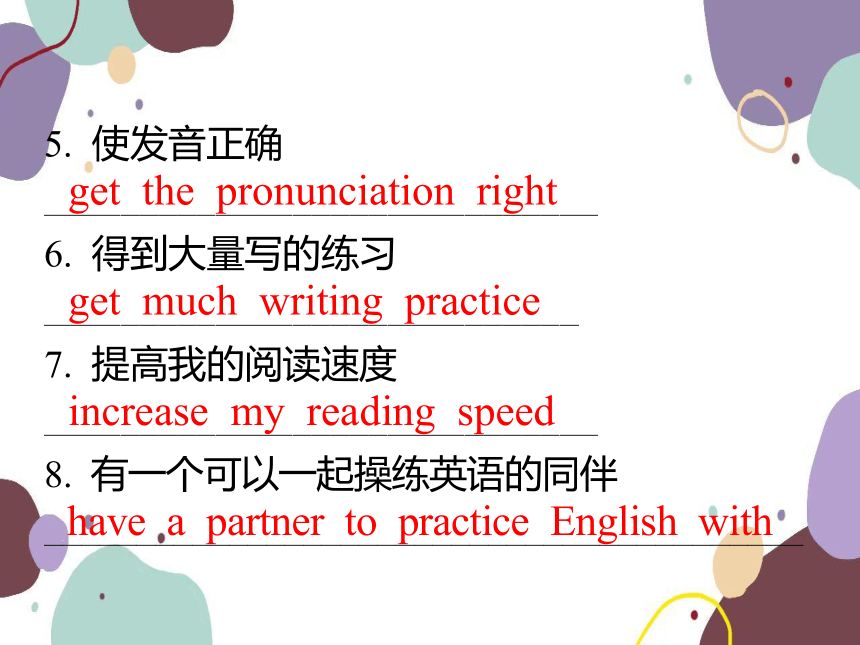

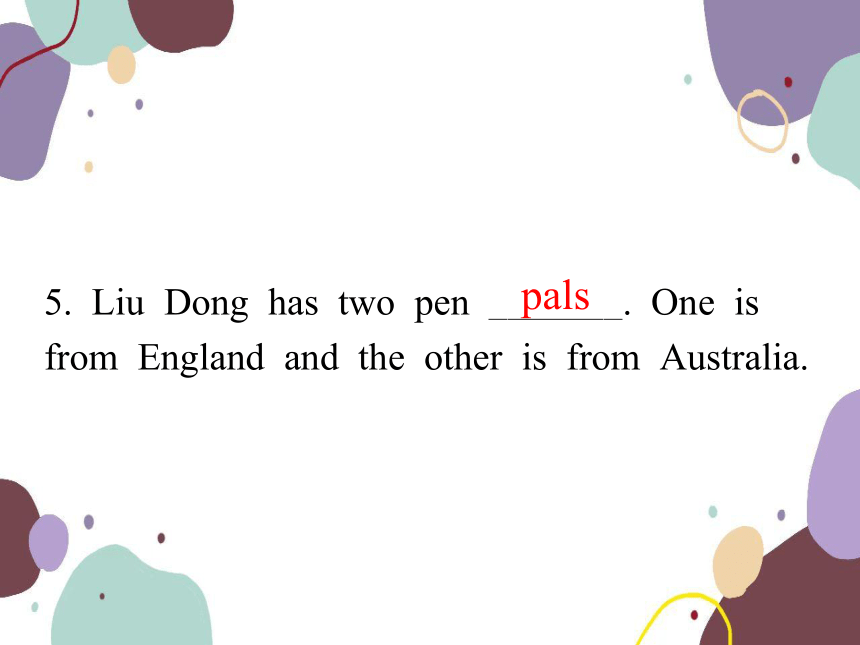
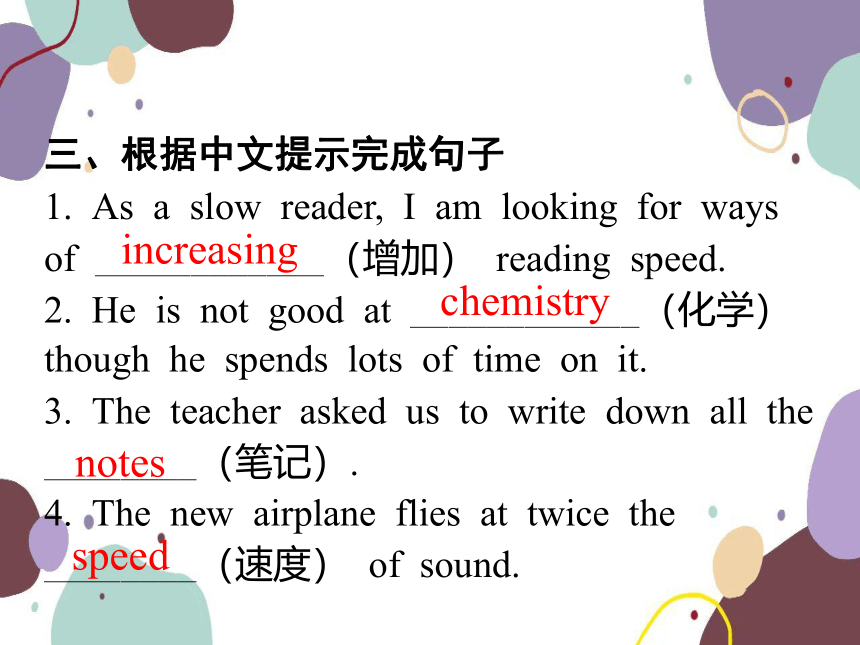
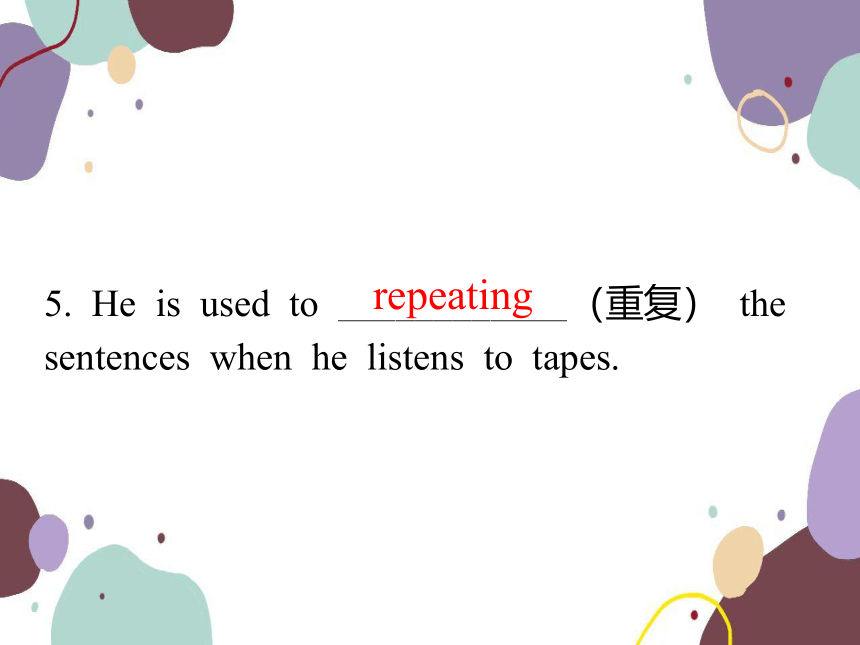
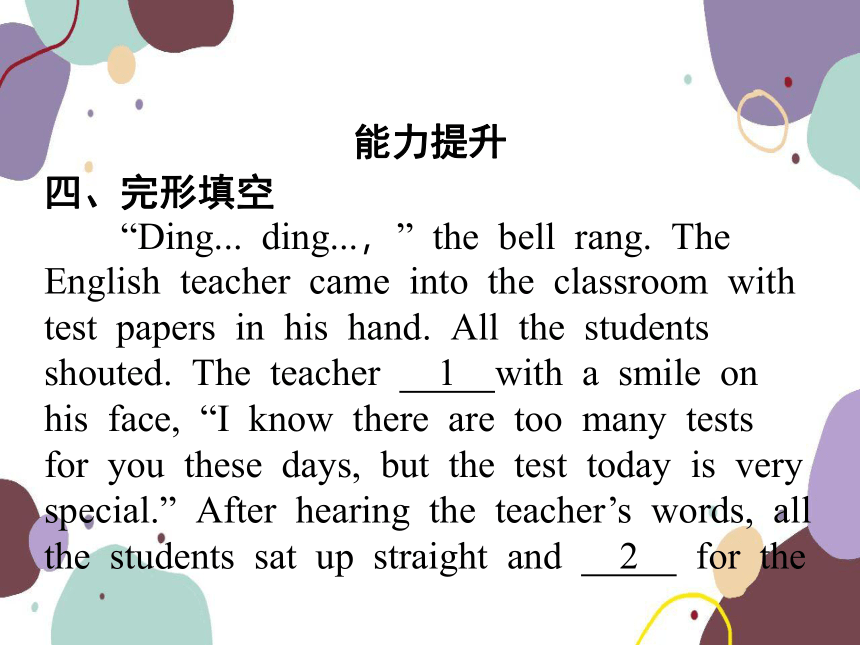

文档简介
(共28张PPT)
Unit 1 How can we become
good learners
Period 3(Section A Grammar
Focus - Section B 1e)
基础过关
一、词组翻译
1. 通过大声重复 _@1@_______________________
by repeating out loud
2. 做大量笔记
_@2@______________________________________
take a lot of notes/take lots of notes
3. 给我的笔友写一封邮件
_@3@________________________________
write an e-mail to my pen pal
4. 记句型
_@4@____________________________
memorize sentence patterns
5. 使发音正确
_@5@____________________________
get the pronunciation right
6. 得到大量写的练习
_@6@___________________________
get much writing practice
7. 提高我的阅读速度
_@7@____________________________
increase my reading speed
8. 有一个可以一起操练英语的同伴
_@8@________________________________________
have a partner to practice English with
二、用方框中所给单词的适当形式填空
physics pattern memorize pal pronounce
1. This visit will always remain in my _@9@__________.
memory
2. I always practice _@10@______________ in the morning.
pronouncing
3. Learning grammar helps me understand the sentence _@11@_________ better.
patterns
4. Lisa is very good at _@12@_________. She often gets good grades in it.
physics
pals
5. Liu Dong has two pen _@13@______. One is from England and the other is from Australia.
三、根据中文提示完成句子
1. As a slow reader, I am looking for ways of _@14@___________(增加) reading speed.
increasing
2. He is not good at _@15@___________(化学) though he spends lots of time on it.
chemistry
3. The teacher asked us to write down all the _@16@_______(笔记).
notes
4. The new airplane flies at twice the _@17@_______(速度) of sound.
speed
5. He is used to _@18@___________(重复) the sentences when he listens to tapes.
repeating
“Ding... ding...,” the bell rang. The English teacher came into the classroom with test papers in his hand. All the students shouted. The teacher 1 with a smile on his face, “I know there are too many tests for you these days, but the test today is very special.” After hearing the teacher’s words, all the students sat up straight and 2 @20@ for the
能力提升
四、完形填空
test to begin. The teacher started to 3 @21@ the test papers to each student. 4 @22@ he finished handing out the test papers, he asked them to begin.
There was not a question but only a small black “X” in the middle of the paper. The students were very 5 to see that. The teacher noticed the students’ surprise. Then he
said, “I would like you to 6 @24@ about what you see there. You must finish it all by
7 @25@.”
All the students thought about it hard and then wrote down their answers quietly. At the end of the class, the teacher collected their papers and read the answers. 8 @26@ of them described the black “X”. The next day,
the teacher said, “Everybody only paid attention to the black ‘X’, but 9 @27@ wrote about the white paper.” The whole class listened 10 , because they worried that they might fail the exam.
Then the teacher said, “Don’t worry about the results of this test. I just want you to think about your life.” Everyone smiled.
The teacher added, “The white paper is like our whole life and the black ‘X’ in the middle of the paper is just 11 @29@ problems in our daily life. Do you have some more thoughts?”
Then the students discussed and expressed 12 @30@ opinions actively. Finally they understood the teacher and this special test.
Our life is a 13 given to us by God, with love and care. 14 , we just care about the problems like illness and hunger, and never see that these problems are much smaller than everything else we have in our life.
We should try to take our eye off problems and 15 @33@ each moment life gives us. Only then can we start a nice journey and find true happiness in our life.
( @34@ )1. A. asked B. spoke
C. explained D. guessed
C
( @35@ )2. A. waited B. looked
C. searched D. cared
A
( @36@ )3. A. sell out B. bring out
C. give out D. go out
C
( @37@ )4. A. Before B. After
C. While D. Until
B
( @38@ )5. A. happy B. sad
C. surprised D. relaxed
C
( @39@ )6. A. hear B. worry
C . write D. learn
C
( @40@ )7. A. yourselves B. ourselves
C. myself D. themselves
A
( @41@ )8. A. None B. All
C. Neither D. Both
B
( @42@ )9. A. somebody B. nobody
C. everybody D. anybody
B
( @43@ )10. A. quickly B. hardly
C. angrily D. carefully
D
( @44@ )11. A. like B. in C. at D. with
A
( @45@ )12. A. her B. his C. their D. your
C
( @46@ )13. A. problem B. challenge
C. gift D. window
C
( @47@ )14. A. Except B. However
C. Also D. Instead
B
( @48@ )15. A. enjoy B. waste
C. invite D. throw
A
I’ve been working in a school for more than twenty years.
Many parents often ask me, “How can you teach your child good study skills How can he or she get the homework done as quickly as possible?” Here are some tips:
◆If the child is as young as nine or ten, ask him or her to prepare a small notebook
五、阅读理解
to write down the homework given by his or her teachers. By developing this habit, he or she will learn to be much more responsible(负责的).
◆Find a good place to study. This should be a quiet place that is free from everything but study things. No games, computers or televisions. Once you have decided on a
place to study, this should be the special place where your child does his or her homework and studies. Usually, homework should be done as soon as the child gets home from school. Of course, it is a good idea to allow the child to have a healthy snack before the work begins.
◆Also, remember that it is the child’s
duty to do his or her homework. Some children give up easily and go to Mom and Dad for help when they have a problem. Try to let them solve it first. By doing this, they’ll get a sense of success from overcoming problems. In this way we help them to help themselves.
( @49@ )1. What does the writer do
A. A reporter. B. A teacher.
C. A worker. D. A student.
B
( @50@ )2. What should a kid of nine or ten years old do to be more responsible
A. Do as much homework as he or she can.
B. Try to do as little homework as he or she can.
C. Learn to write down what the homework is every day.
D. Learn to finish his or her homework on time every day.
C
( @51@ )3. The study place should be __.
A. a quiet place with nothing
B. a large place with everything
C. a very bright place with nothing
D. a quiet place with only study things
D
( @52@ )4. What does the underlined word “overcoming” mean in the passage
A. Forgetting. B. Leaving.
C. Realizing. D. Beating.
D
( @53@ )5. The passage is written for __.
A. parents to help their children study well
B. children who want to study well
C. teachers to teach their students
D. housewives to make their kids clever
A
阅读下面短文,在空白处填入一个适当的词,或填入括号中所给单词的正确形式。
Most Chinese students think English is difficult to learn. What do you think Here is some advice on learning English.
When you learn a new word, don’t just memorize it. 1_@54@_________, try to use it in the sentences. And use it as often as you can
Instead
六、语法填空
on the 2_@55@______(one) day you learn it. You will remember the new words much 3_@56@_____________(easy) in this way.
Practicing sounds, you know, 4_@57@____(be) difficult. Take the “th” sound for example: Choose the words that begin with “th” and repeat them over and over again 5_@58@______ you pronounce them well. Have a try!
more easily
is
until
first
Read, read and read! Reading is one of 6_@59@__________(good) ways to increase your vocabulary and improve your grammar. It’s important to choose the books you are 7_@60@___________(interest) in.
8_@61@________someone is talking with you in English, listen for the main points. If you hear a new word, ignore(忽略) it and go
interested
When
the best
on 9_@62@__________(listen). If you stop and think about the word, you 10_@63@___________(miss) something else that the person is saying.
listening
will miss
Unit 1 How can we become
good learners
Period 3(Section A Grammar
Focus - Section B 1e)
基础过关
一、词组翻译
1. 通过大声重复 _@1@_______________________
by repeating out loud
2. 做大量笔记
_@2@______________________________________
take a lot of notes/take lots of notes
3. 给我的笔友写一封邮件
_@3@________________________________
write an e-mail to my pen pal
4. 记句型
_@4@____________________________
memorize sentence patterns
5. 使发音正确
_@5@____________________________
get the pronunciation right
6. 得到大量写的练习
_@6@___________________________
get much writing practice
7. 提高我的阅读速度
_@7@____________________________
increase my reading speed
8. 有一个可以一起操练英语的同伴
_@8@________________________________________
have a partner to practice English with
二、用方框中所给单词的适当形式填空
physics pattern memorize pal pronounce
1. This visit will always remain in my _@9@__________.
memory
2. I always practice _@10@______________ in the morning.
pronouncing
3. Learning grammar helps me understand the sentence _@11@_________ better.
patterns
4. Lisa is very good at _@12@_________. She often gets good grades in it.
physics
pals
5. Liu Dong has two pen _@13@______. One is from England and the other is from Australia.
三、根据中文提示完成句子
1. As a slow reader, I am looking for ways of _@14@___________(增加) reading speed.
increasing
2. He is not good at _@15@___________(化学) though he spends lots of time on it.
chemistry
3. The teacher asked us to write down all the _@16@_______(笔记).
notes
4. The new airplane flies at twice the _@17@_______(速度) of sound.
speed
5. He is used to _@18@___________(重复) the sentences when he listens to tapes.
repeating
“Ding... ding...,” the bell rang. The English teacher came into the classroom with test papers in his hand. All the students shouted. The teacher 1 with a smile on his face, “I know there are too many tests for you these days, but the test today is very special.” After hearing the teacher’s words, all the students sat up straight and 2 @20@ for the
能力提升
四、完形填空
test to begin. The teacher started to 3 @21@ the test papers to each student. 4 @22@ he finished handing out the test papers, he asked them to begin.
There was not a question but only a small black “X” in the middle of the paper. The students were very 5 to see that. The teacher noticed the students’ surprise. Then he
said, “I would like you to 6 @24@ about what you see there. You must finish it all by
7 @25@.”
All the students thought about it hard and then wrote down their answers quietly. At the end of the class, the teacher collected their papers and read the answers. 8 @26@ of them described the black “X”. The next day,
the teacher said, “Everybody only paid attention to the black ‘X’, but 9 @27@ wrote about the white paper.” The whole class listened 10 , because they worried that they might fail the exam.
Then the teacher said, “Don’t worry about the results of this test. I just want you to think about your life.” Everyone smiled.
The teacher added, “The white paper is like our whole life and the black ‘X’ in the middle of the paper is just 11 @29@ problems in our daily life. Do you have some more thoughts?”
Then the students discussed and expressed 12 @30@ opinions actively. Finally they understood the teacher and this special test.
Our life is a 13 given to us by God, with love and care. 14 , we just care about the problems like illness and hunger, and never see that these problems are much smaller than everything else we have in our life.
We should try to take our eye off problems and 15 @33@ each moment life gives us. Only then can we start a nice journey and find true happiness in our life.
( @34@ )1. A. asked B. spoke
C. explained D. guessed
C
( @35@ )2. A. waited B. looked
C. searched D. cared
A
( @36@ )3. A. sell out B. bring out
C. give out D. go out
C
( @37@ )4. A. Before B. After
C. While D. Until
B
( @38@ )5. A. happy B. sad
C. surprised D. relaxed
C
( @39@ )6. A. hear B. worry
C . write D. learn
C
( @40@ )7. A. yourselves B. ourselves
C. myself D. themselves
A
( @41@ )8. A. None B. All
C. Neither D. Both
B
( @42@ )9. A. somebody B. nobody
C. everybody D. anybody
B
( @43@ )10. A. quickly B. hardly
C. angrily D. carefully
D
( @44@ )11. A. like B. in C. at D. with
A
( @45@ )12. A. her B. his C. their D. your
C
( @46@ )13. A. problem B. challenge
C. gift D. window
C
( @47@ )14. A. Except B. However
C. Also D. Instead
B
( @48@ )15. A. enjoy B. waste
C. invite D. throw
A
I’ve been working in a school for more than twenty years.
Many parents often ask me, “How can you teach your child good study skills How can he or she get the homework done as quickly as possible?” Here are some tips:
◆If the child is as young as nine or ten, ask him or her to prepare a small notebook
五、阅读理解
to write down the homework given by his or her teachers. By developing this habit, he or she will learn to be much more responsible(负责的).
◆Find a good place to study. This should be a quiet place that is free from everything but study things. No games, computers or televisions. Once you have decided on a
place to study, this should be the special place where your child does his or her homework and studies. Usually, homework should be done as soon as the child gets home from school. Of course, it is a good idea to allow the child to have a healthy snack before the work begins.
◆Also, remember that it is the child’s
duty to do his or her homework. Some children give up easily and go to Mom and Dad for help when they have a problem. Try to let them solve it first. By doing this, they’ll get a sense of success from overcoming problems. In this way we help them to help themselves.
( @49@ )1. What does the writer do
A. A reporter. B. A teacher.
C. A worker. D. A student.
B
( @50@ )2. What should a kid of nine or ten years old do to be more responsible
A. Do as much homework as he or she can.
B. Try to do as little homework as he or she can.
C. Learn to write down what the homework is every day.
D. Learn to finish his or her homework on time every day.
C
( @51@ )3. The study place should be __.
A. a quiet place with nothing
B. a large place with everything
C. a very bright place with nothing
D. a quiet place with only study things
D
( @52@ )4. What does the underlined word “overcoming” mean in the passage
A. Forgetting. B. Leaving.
C. Realizing. D. Beating.
D
( @53@ )5. The passage is written for __.
A. parents to help their children study well
B. children who want to study well
C. teachers to teach their students
D. housewives to make their kids clever
A
阅读下面短文,在空白处填入一个适当的词,或填入括号中所给单词的正确形式。
Most Chinese students think English is difficult to learn. What do you think Here is some advice on learning English.
When you learn a new word, don’t just memorize it. 1_@54@_________, try to use it in the sentences. And use it as often as you can
Instead
六、语法填空
on the 2_@55@______(one) day you learn it. You will remember the new words much 3_@56@_____________(easy) in this way.
Practicing sounds, you know, 4_@57@____(be) difficult. Take the “th” sound for example: Choose the words that begin with “th” and repeat them over and over again 5_@58@______ you pronounce them well. Have a try!
more easily
is
until
first
Read, read and read! Reading is one of 6_@59@__________(good) ways to increase your vocabulary and improve your grammar. It’s important to choose the books you are 7_@60@___________(interest) in.
8_@61@________someone is talking with you in English, listen for the main points. If you hear a new word, ignore(忽略) it and go
interested
When
the best
on 9_@62@__________(listen). If you stop and think about the word, you 10_@63@___________(miss) something else that the person is saying.
listening
will miss
同课章节目录
- Unit 1 How can we become good learners.
- Section A
- Section B
- Unit 2 I think that mooncakes are delicious!
- Section A
- Section B
- Unit 3 Could you please tell me where the restroom
- Section A
- Section B
- Unit 4 I used to be afraid of the dark.
- Section A
- Section B
- Unit 5 What are the shirts made of?
- Section A
- Section B
- Review of Units 1-5
- Unit 6 When was it invented?
- Section A
- Section B
- Unit 7 Teenagers should be allowed to choose their
- Section A
- Section B
- Unit 8 It must belong to Carla.
- Section A
- Section B
- Unit 9 I like music that I can dance to.
- Section A
- Section B
- Unit 10 You're supposed to shake hands.
- Section A
- Section B
- Review of Units 6-10
- Unit 11 Sad movies make me cry.
- Section A
- Section B
- Unit 12 Life is full of the unexpected
- Section A
- Section B
- Unit 13 We're trying to save the earth!
- Section A
- Section B
- Unit 14 I remember meeting all of you in Grade 7.
- Section A
- Section B
- Review of Units 11-14
